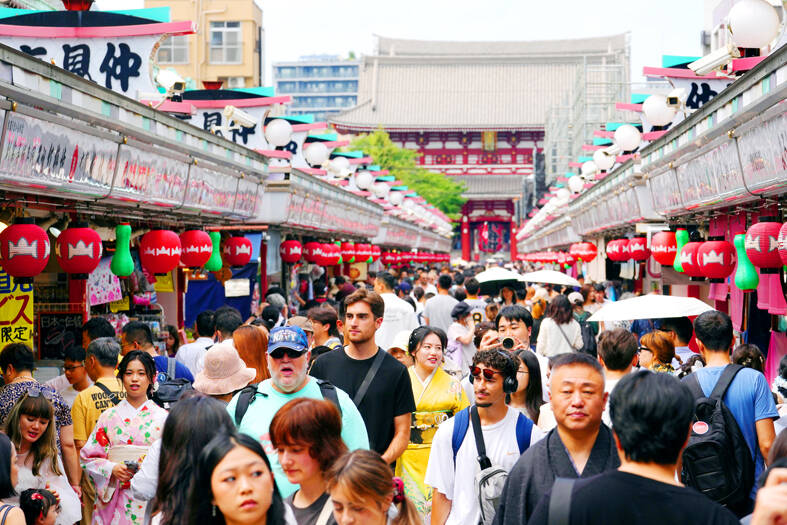As COVID-19 cases in Japan have been increasing for 10 consecutive weeks, people should get vaccinated before visiting the nation, the Centers for Disease Control (CDC) said.
The centers reported 773 hospitalizations and 124 deaths related to COVID-19 in Taiwan last week.
CDC Epidemic Intelligence Center Director Guo Hung-wei (郭宏偉) on Tuesday said the number of weekly COVID-19 cases reported in Japan has been increasing since mid-May and surpassed 55,000 cases from July 8 to July 14.

Photo: EPA-EFE
The average number of COVID-19 patients at Japan’s healthcare facilities that week was also 1.39 times that of the week before and KP.3 is the dominant SARS-CoV-2 variant in Japan, he said.
The average positive test rate for COVID-19 was 10.7 percent globally in the first week of this month, and is still growing, he said, adding that the dominant variants worldwide are KP.3, JN.1 and KP.2.
CDC Deputy Director-General Philip Lo (羅一鈞) said many people in Taiwan are visiting Japan this summer and the centers encourage them to receive an XBB.1.5-adapted COVID-19 vaccine before their trip.
Regarding local cases in Taiwan, Guo said 733 hospitalized cases were reported between from Tuesday last week to Monday, which was about 13.7 percent fewer than the previous week, but the number of weekly deaths had increased to 124 last week.
The weekly COVID-19 death number is the highest in 11 months.
“The death numbers usually peak about two to four weeks after the peak of mild cases, as it is a lagging indicator,” Lo said.
This is why mild cases and hospitalizations are falling, but the number of deaths is increasing.
CDC physician Lin Yung-ching (林詠青) said that among the deaths last week was a young man in his 20s with no underlying health condition, and he received his last dose of vaccine in 2022, which was not a XBB.1.5-adapted vaccine.
The man began experiencing a fever and muscle soreness last month, and two days later had convulsions, fell unconscious and had low blood pressure, so he was rushed to a hospital, where he tested positive for COVID-19, Lin said.
The tests showed that he had pneumonia and encephalitis, so the man was intubated for respiratory failure and given anti-viral medication while in an intensive care unit, he said.
The man died of worsened complications three weeks later, he added.
Meanwhile, Gou said four new cases of mpox were reported last week.
Four men in their 30s and 40s, who had symptoms including rashes, blisters and pustules, were found to have mpox, he said.
A total of 13 cases have been reported this month, CDC data showed, the highest monthly number since October last year and more than 80 percent were unvaccinated.
Lo said the centers expect mpox cases to continue increasing during the summer, as there are more large and crowded gatherings.
People who are at high risk and eligible for vaccination should get fully vaccinated with two doses to protect themselves and their loved ones, Lo added.

Twenty-four Republican members of the US House of Representatives yesterday introduced a concurrent resolution calling on the US government to abolish the “one China” policy and restore formal diplomatic relations with Taiwan. Led by US representatives Tom Tiffany and Scott Perry, the resolution calls for not only re-establishing formal relations, but also urges the US Trade Representative to negotiate a free-trade agreement (FTA) with Taiwan and for US officials to advocate for Taiwan’s full membership in the UN and other international organizations. In a news release announcing the resolution, Tiffany, who represents a Wisconsin district, called the “one China” policy “outdated, counterproductive

Actress Barbie Hsu (徐熙媛) has “returned home” to Taiwan, and there are no plans to hold a funeral for the TV star who died in Japan from influenza- induced pneumonia, her family said in a statement Wednesday night. The statement was released after local media outlets reported that Barbie Hsu’s ashes were brought back Taiwan on board a private jet, which arrived at Taipei Songshan Airport around 3 p.m. on Wednesday. To the reporters waiting at the airport, the statement issued by the family read “(we) appreciate friends working in the media for waiting in the cold weather.” “She has safely returned home.

ON PAROLE: The 73-year-old suspect has a criminal record of rape committed when he was serving in the military, as well as robbery and theft, police said The Kaohsiung District Court yesterday approved the detention of a 73-year-old man for allegedly murdering three women. The suspect, surnamed Chang (張), was arrested on Wednesday evening in connection with the death of a 71-year-old woman surnamed Chao (趙). The Kaohsiung City Police Department yesterday also unveiled the identities of two other possible victims in the serial killing case, a 75-year-old woman surnamed Huang (黃), the suspect’s sister-in-law, and a 75-year-old woman surnamed Chang (張), who is not related to the suspect. The case came to light when Chao disappeared after taking the suspect back to his residence on Sunday. Police, upon reviewing CCTV

TRUMP ERA: The change has sparked speculation on whether it was related to the new US president’s plan to dismiss more than 1,000 Joe Biden-era appointees The US government has declined to comment on a post that indicated the departure of Laura Rosenberger as chair of the American Institute in Taiwan (AIT). Neither the US Department of State nor the AIT has responded to the Central News Agency’s questions on the matter, after Rosenberger was listed as a former chair on the AIT’s official Web site, with her tenure marked as 2023 to this year. US officials have said previously that they usually do not comment on personnel changes within the government. Rosenberger was appointed head of the AIT in 2023, during the administration of former US president Joe